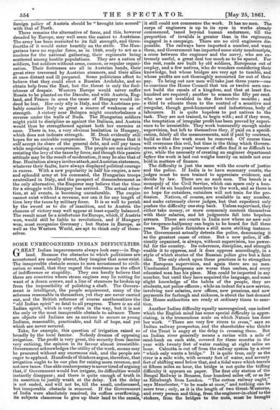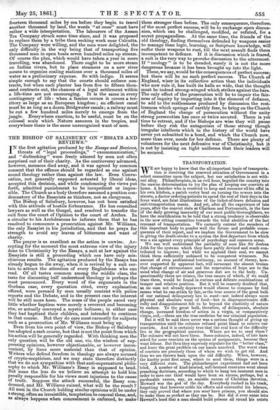SOME UNRECOGNIZED INDIAN DIFFICULTIES.
GREAT Indian improvements always look easy—in Eng- land. Because the obstacles to which politicians are accustomed are usually absent, they imagine that none exist. The insuperable obstacle seems to men accustomed to civili- zation so small, that they regard the resistance as the effect of indifference or stupidity. They can hardly believe that there are countries where steam engines may lie rotting for want of a dozen screws, and a line of steamers be broken up from the impossibility of polishing a shaft. The Govern- ment is intelligent, the people acquiescent, many of the schemes reasonable in themselves, yet they are never carried out, and the British reformer of course anathematizes the " old Indian spirit" so fatal to all progress. There is an old Indian spirit, which is very often in the way, but it is not the only or the most insuperable obstacle to advance. There are objects old Indians are as anxious to secure as young Indians, reasonable, practicable, and full of hope, and yet which are never secured.
Take, for example, this question of irrigation raised so broadly by the local famine. Nobody dreams of opposing irrigation. The profit is very great, the security from famine very enticing, the opinion in its favour almost irresistible. Government acknowledges the utility of the work, means may be procured without any enormous risk, and the people are eager to applaud. Hundreds of thinkers argue, therefore, that irrigation ought to be our plan for raising more revenue, and not new taxes. One able contemporaryis never tired of arguing that, if Government would but irrigate, its difficulties would instantly disappear; and there is quite enough of truth in its assertion to justify wrath at the delay. Yet the delay is not ended, and will not be, till the small, undiscussed, but insuperable obstacle is removed. If the Government of India were absolutely resolved, its coffers overflowing, its subjects clamorous to give up their land to the canals, it still could not commence the work. It has no men. The corps of engineers is up to its eyes in works already commenced, taxed beyond human endurance, till the proportion of invalids is greater than in the regiments engaged in a campaign. There are no civil engineers dis- posable. The railways have imported a number, and want them, and Government has imported some sixty nondescripts, a cross between the engineer and the navvy, who are ex- tremely useful, a great deal too much so to be spared. For the rest, roads are built by old soldiers, Europeans out of employ, and a few natives, who do wonders considering their knowledge, but whose bridges are very apt to tumble, and whose profits are not thoroughly accounted for out of their pay. To bring out new men will take just three years—one to convince the Home Council that ten or twelve men can- not build the canals of a kingdom, and that at least five hundred are required ; another to season the fifty per cent. who are not invalided in the first twelve months ; and a third to educate them to the control of a sensitive and irregular, though good-humoured and industrious, body of labourers. It is quite hopeless to put natives to the task. They are not trained, to begin with ; and if they were, the temptation of irregular profit has been proved by experi- ence to be irresistible. They work honourably enough under supervision, but left to themselves they, if paid on a specifi- cation, falsify all the measurements, and if paid by contract, build so that the work must be removed. Of course time will overcome this evil, but time is the thing which Govern- ments with a five years' tenure of office find it so difficult to give, while the necessity of creating an engineer department before the work is laid out weighs heavily on minds not over bold in matters of finance.
The difficulty is just the same with the courts of justice and the police. If India is to have summary courts, the judges must be men trained to appreciate evidence, and decide by law. There are no such men. The bench is a monopoly of the Civil Service, which can spare only a hun- dred of its six hundred members to the work, and as there is no hope for outsiders, outsiders will not train for the pro- fession. Natives, of course, are available in any number, and make extremely clever judges, but that expedient only pushes the difficulty one step back. Unless supervised, they either take money, or more commonly content themselves with their salaries, and let judgments fall into hopeless arrears. There are courts in India now where no new suit for twopence-halfpenny can begin to be heard for full three years. The police furnishes a still more striking instance. The Government actually detests the police, denouncing it as the greatest cause of crime. But a new police, if effi- ciently organized, is always, without supervision, too power- ful for the country. Its coherence, discipline, and strength enable it to oppress, and it does oppress accordingly, in a style of which stories of the Russian police give but a faint idea. The only check upon these practices is to strengthen the European supervision, and again there are no men. Uneducated Europeans are worse than useless, and every educated man has his place. Men could be imported in any number, but until they have acquired the language, and some slight knowledge of the habits of the people, they are students, not police officers ; while an indent for a new service, involving new salaries, new offices, new pensions, and new payments for furlough and sickness, is about the last demand the Home authorities are ready at ordinary times to sanc- tion.
Another Indian difficulty equally unrecognized, one indeed which the English mind has some special difficulty in appre- ciating, is the tremendous scale on which Nature has done her work. "There are very few rivers to cross," says an Indian railway prospectus, and the shareholder who thinks of the Trent is angry at the delay in crossing them. But an Indian river generally means a ravine with a mile of sand-bank on each side, covered for three months in the year with twenty feet of water rushing at eight miles an hour. Calcutta is cut off from the railway system by a river "which only wants a bridge." It is quite true, only as the river is a mile wide, with seventy feet of water, and seventy feet of shifting sand below that, and a tidal wave which travels at fifteen miles an hour, the bridge is not quite the trifling difficulty it appears on paper. The first city station of the Bengal Railway is Benares, four hundred miles off, or as far as Edinburgh from London. " The cotton railway ought,' says Manchester, " to be made at once," and nothing can be more true ; only, as it is the length of two Great-Westerns, and every person and thing, from the engineer-in-chief to the stokers, from the bridges to the nuts, must be brought fourteen thousand miles by sea before they begin to travel another thousand by land, the words "at once" must have rather a wide interpretation. The labourers of the Assam Tea Company struck some time since, and it was proposed to replace them by a tribe then seeking work near Calcutta. The Company were willing, and the men were delighted, the only difficulty in the way being that of transporting five thousand men in open boats seven hundred miles up stream. Of course the plan, which would have taken a year in mere travelling, was abandoned. There ought to be more steam on Indian rivers, but to place steamers on a new river means to organize coaling stations over a thousand miles of water as a preliminary expense. So with indigo. It seems simple enough to say that the courts should enforce con- tracts, but when each planter has from five to fifteen thou- sand contracts out, the chances of a legal settlement within a life-time are not encouraging. It is the same in every contingency of life : when a famine occurs it covers a ter- ritory as large as an European kingdom ; an efficient canal must be as long as a dozen Bridgwater canals ; a railway must be cut a few hundred miles merely to emerge from the jungle. Everywhere exertion, to be useful, must be on the colossal scale which Nature assumes in the tropics, and everywhere there is the same unrecognized want of men.































 Previous page
Previous page